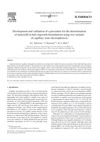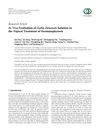 23 citations,
July 2008 in “British journal of dermatology/British journal of dermatology, Supplement”
23 citations,
July 2008 in “British journal of dermatology/British journal of dermatology, Supplement” Topical contact sensitizers can treat certain skin conditions but are rarely used in the U.K.
 November 2017 in “Dermatologic Therapy”
November 2017 in “Dermatologic Therapy” A new topical solution safely reduces hair shedding by 38% on average by tightening a muscle in the scalp.
 17 citations,
August 2007 in “Bioorganic & Medicinal Chemistry Letters”
17 citations,
August 2007 in “Bioorganic & Medicinal Chemistry Letters” A compound made by Pfizer can potentially stimulate hair growth and reduce oil production, making it a good candidate for topical use.
 14 citations,
May 2005 in “Farmaco”
14 citations,
May 2005 in “Farmaco” A method was created in 2005 to identify minoxidil, a hair growth ingredient, in products using two types of capillary zone electrophoresis, and it found that most products had about 2% minoxidil.
 January 2017 in “Journal of Investigative Dermatology Symposium Proceedings”
January 2017 in “Journal of Investigative Dermatology Symposium Proceedings” The 2015 Hair Research Congress concluded that stem cells, maraviroc, and simvastatin could potentially treat Alopecia Areata, topical minoxidil, finasteride, and steroids could treat Frontal Fibrosing Alopecia, and PTGDR2 antagonists could also treat alopecia. They also found that low-level light therapy could help with hair loss, a robotic device could assist in hair extraction, and nutrition could aid hair growth. They suggested that Alopecia Areata is an inflammatory disorder, not a single disease, indicating a need for personalized treatments.
 67 citations,
January 2007 in “Climacteric”
67 citations,
January 2007 in “Climacteric” Estrogens and SERMs can help with skin aging, but their safety and effectiveness need more research.
 January 1982 in “Side effects of drugs annual”
January 1982 in “Side effects of drugs annual” High doses of certain vitamins can cause serious side effects and health risks.
 55 citations,
July 2016 in “Dermatologic Therapy”
55 citations,
July 2016 in “Dermatologic Therapy” Multiple treatments work best for hair loss.
 1 citations,
August 2013 in “Springer eBooks”
1 citations,
August 2013 in “Springer eBooks” Birth control pills and anti-androgen medications help manage hair growth, acne, and hair loss in women with PCOS.
 February 2024 in “ACS Omega”
February 2024 in “ACS Omega” The Shen Bai Hair Growing Decoction may help treat hair loss by promoting hair growth and reducing inflammation.
 March 2024 in “International journal of nanomedicine”
March 2024 in “International journal of nanomedicine” Polymeric nanohydrogels show potential for skin drug delivery but have concerns like toxicity and regulatory hurdles.
 4 citations,
January 2019 in “PubMed”
4 citations,
January 2019 in “PubMed” Patterned hair loss in women is linked to hormonal imbalances and biochemical changes, and should be evaluated for underlying health issues.
 January 2023 in “International Journal of Medicine in Developing Countries”
January 2023 in “International Journal of Medicine in Developing Countries” Topical minoxidil improved hair loss in a patient when used consistently.
 5 citations,
August 2014 in “Pharmaceutical Development and Technology”
5 citations,
August 2014 in “Pharmaceutical Development and Technology” Propylene glycol and ethanol increase finasteride skin absorption, sodium lauryl sulfate doesn't.
 63 citations,
May 2011 in “Clinical cancer research”
63 citations,
May 2011 in “Clinical cancer research” The topical inhibitor CUR61414 was not effective in treating basal cell carcinoma in human trials.
 1 citations,
January 2022 in “Journal of Pharmaceutical Sciences”
1 citations,
January 2022 in “Journal of Pharmaceutical Sciences” The new skin cream with FOL-005 safely promotes hair growth and is stable and user-friendly.
 January 2017 in “Cogent Medicine”
January 2017 in “Cogent Medicine” Extracts improve hair growth in alopecia.
 65 citations,
January 2017 in “Postępy Dermatologii i Alergologii”
65 citations,
January 2017 in “Postępy Dermatologii i Alergologii” High-frequency ultrasonography is a useful but underused tool in dermatology for assessing skin cancers, monitoring diseases, and evaluating treatments.
 23 citations,
October 1988 in “Clinics in Dermatology”
23 citations,
October 1988 in “Clinics in Dermatology” Minoxidil was first made for high blood pressure, but it was later found to help hair growth.
 1 citations,
December 2022 in “Journal of cosmetic dermatology”
1 citations,
December 2022 in “Journal of cosmetic dermatology” The combination of vitamin D analogues with potent steroids is a favorable treatment for alopecia areata with fewer side effects.
 3 citations,
January 2017 in “Evidence-based complementary and alternative medicine”
3 citations,
January 2017 in “Evidence-based complementary and alternative medicine” Galla chinensis solution effectively treats fungal skin infections in dogs.
 22 citations,
January 2002 in “Treatments in endocrinology”
22 citations,
January 2002 in “Treatments in endocrinology” Birth control pills help treat skin and hair growth problems linked to high male hormone levels.
January 2022 in “Journal of Ayurveda case reports” Ayurvedic treatment significantly reduced hair loss and improved hair quality in a 30-year-old male.
 12 citations,
May 2005 in “Current obstetrics and gynaecology/Current obstetrics & gynaecology”
12 citations,
May 2005 in “Current obstetrics and gynaecology/Current obstetrics & gynaecology” Hirsutism is too much hair growth in women like the pattern in men, often caused by high male hormones, and can be treated with hormone control and hair removal methods.
 12 citations,
January 1991 in “Archives of dermatological research”
12 citations,
January 1991 in “Archives of dermatological research” Male hormones control a specific gene in hamster skin, with different hormones having varying effects.
 43 citations,
July 2013 in “Pharmacological reviews”
43 citations,
July 2013 in “Pharmacological reviews” New research on prostamide F2α has led to treatments for glaucoma and eyelash growth and may have more medical uses.
34 citations,
January 2022 in “Molecules/Molecules online/Molecules annual” Natural ingredients in cosmeceuticals are beneficial for skin and hair health with few side effects.
2 citations,
July 2022 in “BioMed Research International” Finasteride-loaded nanogels are effective, safe, and improve drug absorption through the skin.
 January 1983 in “Elsevier eBooks”
January 1983 in “Elsevier eBooks” Cyproterone acetate is used to treat conditions like prostate cancer, early puberty, excessive sexual drive, and female androgenization by affecting androgen functions and suppressing certain hormones.
 2 citations,
August 2020 in “Cosmetics”
2 citations,
August 2020 in “Cosmetics” Herbal formula shows promise for hair loss treatment.



























